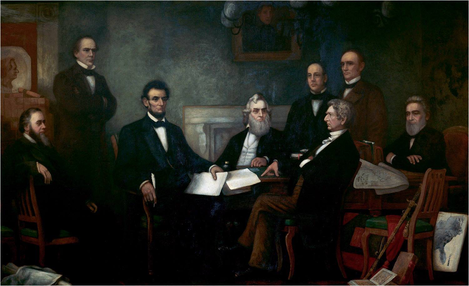 First Reading of the Emancipation Proclamation of President Lincoln" (1864) by Francis Bicknell Carpenter First Reading of the Emancipation Proclamation of President Lincoln" (1864) by Francis Bicknell Carpenter Eb Joseph Daniels, ABG Contributor "We show our sympathy with slavery by emancipating slaves where we cannot reach them and holding them in bondage where we can set them free." - Secretary of State William H. Seward On this day in 1862 President Abraham Lincoln preliminarily issued the Emancipation Proclamation, decreeing that any slaves residing in territory still in open rebellion against the Federal government on January 1, 1863 would be immediately freed under the war powers granted to the president under the Constitution. Having already rescinded a number of previous attempts at emancipation, most famously Major General John C. Fremont’s decree in Missouri, Lincoln began to formulate his own plan for freeing slaves in the spring of 1862. Lincoln had long felt a personal objection to the institution of slavery, but he had vacillated over what ought to be done about it and what authority he had to do it. He also had to balance the wishes of the Radical Republicans and their abolitionist supporters, to whom Lincoln was greatly beholden, and the rest of the nation, for which emancipation was not a principal concern. While many Northerners and Westerners were against slavery as a concept, they could hardly be considered abolitionists. They tended to be opposed to the expansion of slavery or having to be in competition with slave labor, but most had little interest in slavery as it existed in the Southern states. Existing laws and the Constitution itself also provided extensive protections for the "peculiar institution." Lincoln, therefore, framed his proclamation as a final effort to convince the states of the Confederacy that the Federal government had no interest in tampering with their slaves. He later stated in a letter that "After the commencement of hostilities I struggled nearly a year and a half to get along without touching the institution, and when finally I conditionally determined to touch it I gave a hundred days fair notice of my purpose, to all the States and people, within which time they could have turned it wholly aside, by simply again becoming good citizens of the United States. They chose to disregard it, and I made the peremptory proclamation on what appeared to me to be a military necessity. And being made, it must stand.” In addition to potentially coaxing some of the more conservative Southern states, such as Georgia and Tennessee, back into the Union, Lincoln also used the proclamation to reassure the border states that he had no intention of meddling with the Constitutional protections afforded slavery; in early 1862, there was still a chance that Kentucky or Maryland might secede. In order to make it clear that the proclamation was not an act of desperation, Lincoln waited to promulgate it until a Federal military victory. He eventually secured a species of victory, although a costly one, after the Battle of Sharpsburg, and the preliminary issuance was made a few days after the fighting in Maryland had ended. The proclamation also laid the foundation for the enlistment of black soldiers in the Federal army. Many abolitionists had been pushing for black recruitment nearly since the war began, especially Frederick Douglas, who noted that blacks had been reportedly observed fighting for the Confederate army as early as the Battle of First Manassas. despite the fact that such service was contrary to existing Confederate policy. Although the Emancipation Proclamation is rightly seen as a precursor to the adoption of Amendment XIII in 1865, its much-vaunted status as the legal instrument by which slavery was ended disregards its primary intended purpose: to save the Union, even if that salvation required the perpetuation of slavery.
0 Comments
Leave a Reply. |
Sam B.Historian, self-proclaimed gentleman, agrarian-at-heart, & curator extraordinaire Social MediaCategories
All
Archives
November 2022
|




 RSS Feed
RSS Feed
